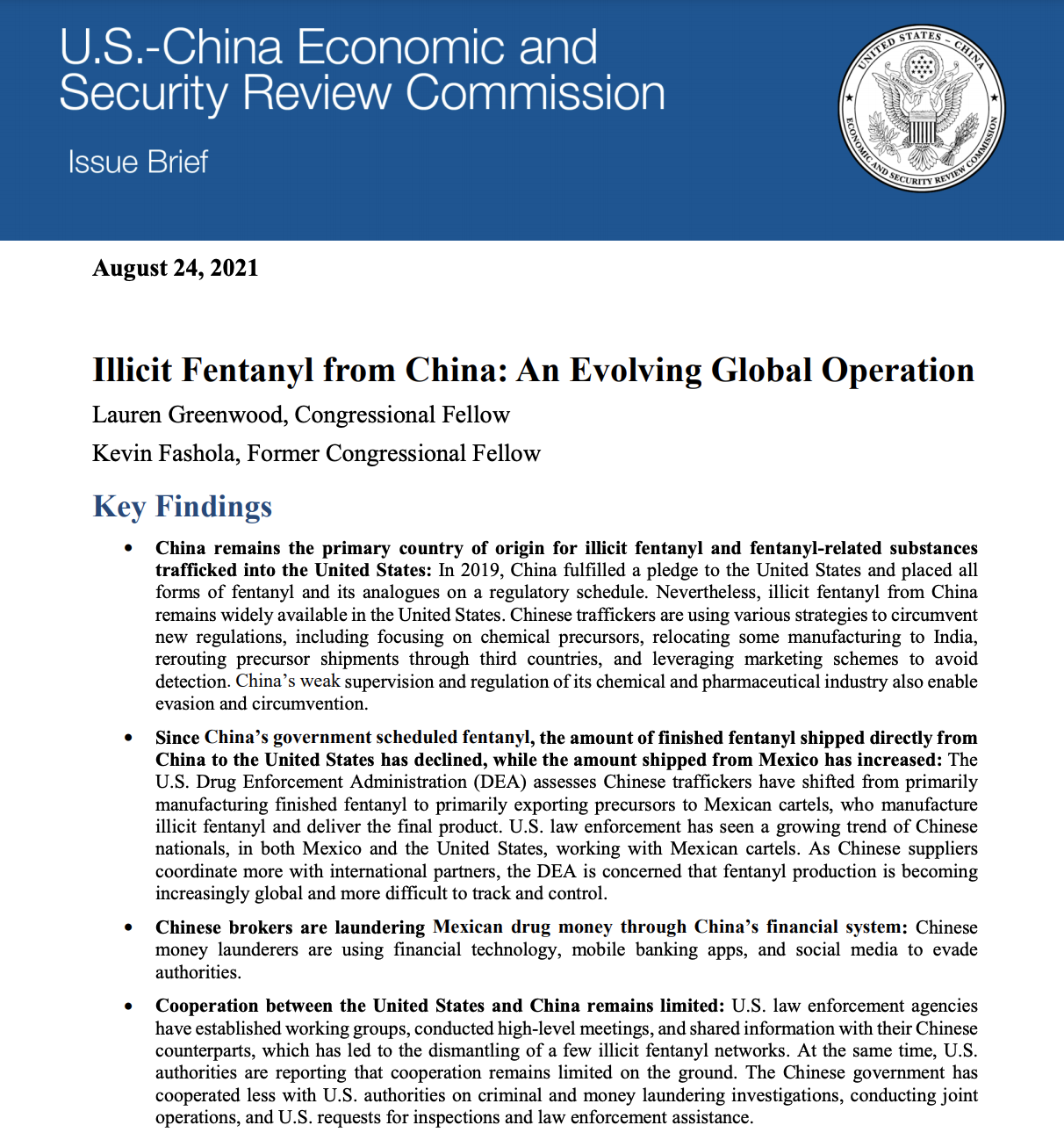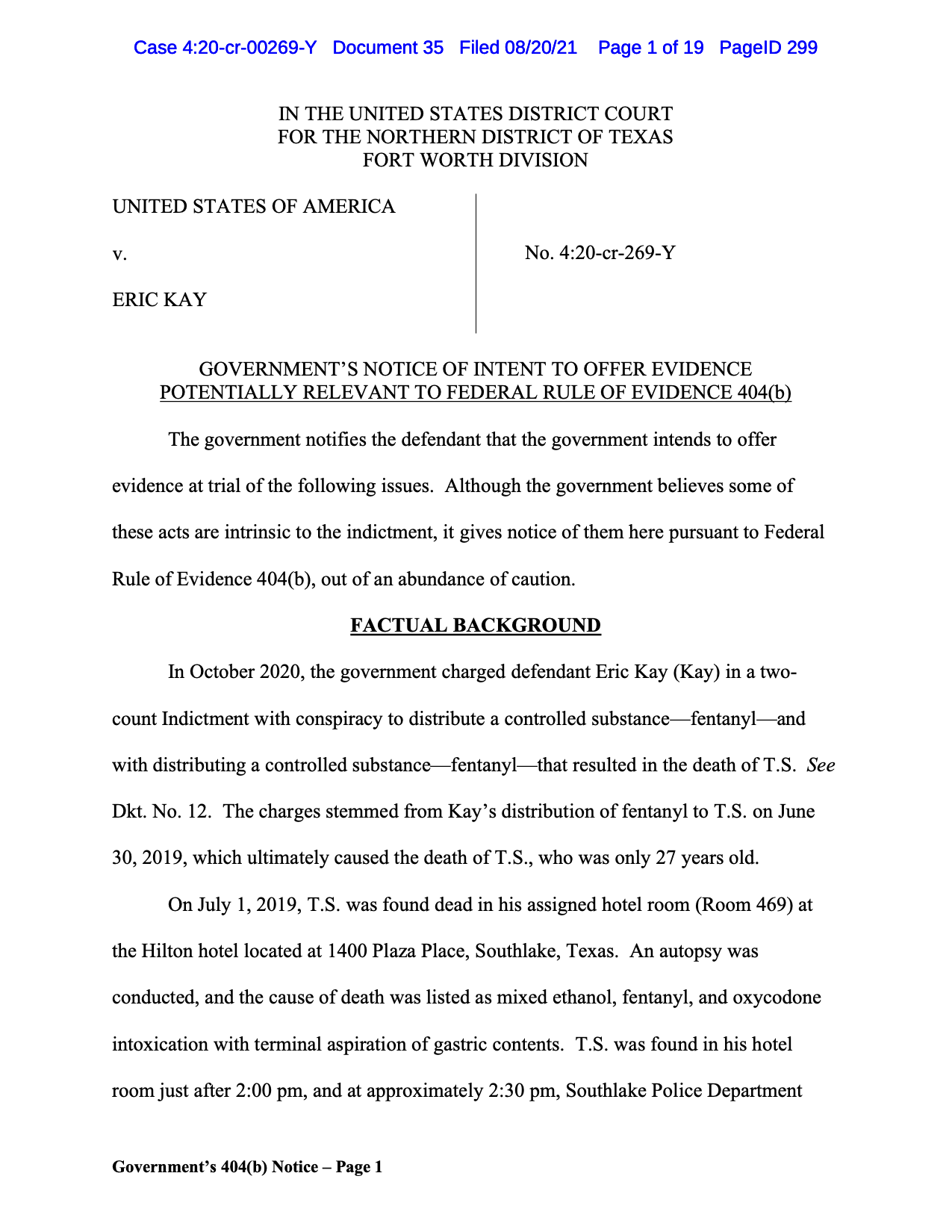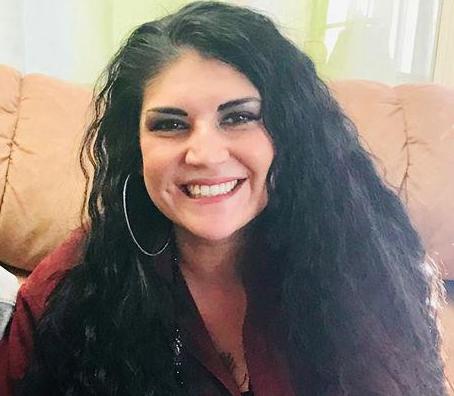August 30, 2021: Rogue labs in China still the ultimate source of illicit fentanyl
The U.S.-China Economic and Security Review Commission released a brief about the evolution of the fentanyl trade since 2019, finding that:
- Even after scheduling fentanyl and fentanyl analogues in 2019, China is still the ultimate source for most of the illicit fentanyl in the U.S.
- Traffickers are evading Chinese enforcement by sending precursor chemicals to be finished in Mexico, and Chinese brokers are laundering money for Mexican cartels.
- The U.S. and China have shut down several illicit fentanyl networks, but limited cooperation hinders U.S. efforts to stop increasingly complex transnational drug rings.
The brief recommends that the U.S. work in concert with other countries affected by the fentanyl trade, that regulators coordinate joint law enforcement operations with Chinese authorities, and that Congress counter money laundering with legislation.
Illicit Fentanyl from China: An Evolving Global Operation, August 24, 2021
Other national news
Cybersecurity experts warned about email phishing attacks exploiting pandemic-related content, including documentation of COVID vaccines.
Pacific West
Read the government's August 2021 notice of intent in the Eric Kay case.
The Sacramento, California District Attorney’s Office launched a public outreach campaign to address a spike in fentanyl-related deaths, particularly as a result of counterfeit prescription pills. The district attorney’s crime lab reports that 92% of seized oxycodone pills were counterfeit. 75% of those pills were entirely made of fentanyl.
A federal jury convicted Jahvaris Springfield of San Diego of selling the counterfeit oxycodone pills made with fentanyl that killed Brendan Gallagher in February 2019.
Police are investigating whether a 14-year-old Concord, California student who died on August 21, 2021 was poisoned by a counterfeit pill made with fentanyl.
Detectives in Paso Robles, California seized more than 1,000 oxycodone pills that tested positive for fentanyl and arrested a resident who was already on probation for drug dealing.
A new court filing alleges that former Angels employee Eric Kay ran a pill distribution ring to supply five Angels players, continuing to arrange pill deliveries, even when he was in treatment for opioid addiction. Kay allegedly provided the pills that killed Tyler Skaggs in July 2019.
Public health officials in Clackamas County, Oregon warned that fentanyl poisonings continue to rise as a result of drug dealing—including counterfeit pill sales—on social media.
Mountain West
Arizona Department of Public Safety detectives arrested three alleged drug traffickers after a search warrant led to the discovery of 4,450 fentanyl pills and 87 pounds of methamphetamine.
As in the rest of the country, authorities in Idaho are warning residents about the prevalence of counterfeit pills made with fentanyl. Voices for Awareness founder and PSM Advisory Board member Andrea Thomas spoke with Boise State Public Radio to help deliver the message. Her 32-year-old daughter, Ashley Romero, died of fentanyl poisoning in 2018 after unknowingly taking half of a counterfeit pain pill.
In Colorado, Boulder County Public Health warned that fake pills that contained fentanyl and other dangerous ingredients had been found in the area.
Law enforcement reported small seizures of counterfeit pills made with fentanyl in Ely, Nevada and Lewiston, Idaho.
Northeast
A Massachusetts resident who allegedly advertised Adderall on Snapchat, and sold counterfeit versions of the drug made of methamphetamine has been indicted. Police found 17 kilograms of the pills during a search of two locations in Worcester.
Former Lawrence, Massachusetts resident Enmanuel Brioso Fabal received a four-year prison sentence for his role in a fentanyl distribution ring. Fabal sold 500 fentanyl pills and more than 50 grams of fentanyl powder to undercover agents in 2019.
Officials in Manchester, New Hampshire warned schools that drug dealers had been selling illicit drugs disguised as Xanax or Adderall to students.
South
55-year-old Benjamin Burdick of Inverness, Florida received a three-year prison sentence for selling counterfeit prescription drugs online. Between April 2019 and October 2020, Burdick manufactured and sold approximately 250,000 counterfeit Xanax pills that contained a variety of benzodiazepines.
A Boca Raton, Florida resident was indicted for fraud. He allegedly collected $12 million in payments for personal protective equipment (“PPE”) during the COVID-19 pandemic and spent the money on luxuries such as a multi-million dollar waterfront mansion .
The Food and Drug Administration warned a Suwanee, Georgia-based online Indian marketplace to stop selling non-FDA approved products as safe and/or effective for the treatment or prevention of COVID-19.
The Greenville, South Carolina Multi-Jurisdictional Drug Enforcement Unit’s annual report makes it clear that Greenville has been a counterfeit pill hot spot: law enforcement seized five pill press machines between July 2020 and June 2021.
The University of South Carolina Police Department in Columbia published a bulletin warning students that buying Adderall, Xanax, Oxycodone, or other drugs without a prescription is illegal, and that “these counterfeit pills may kill you.”
A Cedar Park, Texas family who lost their 19-year-old son, Cameron Stewart, to a counterfeit Valium pill in March 2021 has launched “A Change for Cam,” and is working with Song for Charlie to bring awareness about the dangers of counterfeit pills to Austin-area schools.



